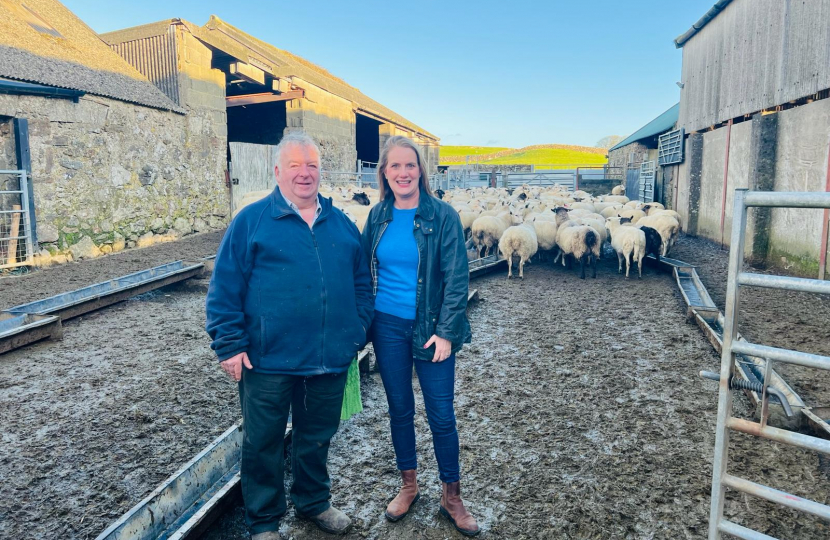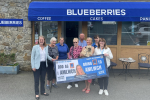
Mae amaeth wedi bod yn asgwrn cefn Ynys Môn ers canrifoedd. Ar ddechrau’r 13eg ganrif, galwyd yr ynys yn “Môn Mam Cymru” oherwydd mai dyma graneri Cymru. Gallai’r ynys gynnal rhan helaeth o boblogaeth y wlad drwy ei chynaeafau digonol.
Agriculture has been the backbone of Ynys Môn for centuries. At the beginning of the 13th century the island was known as "Môn Mam Cymru" Anglesey the Mother of Wales because it was the granary of Wales – capable of sustaining much of the country’s population from its plentiful harvests.
In the 17th century livestock rearing and dairy farming began to replace arable land and we can still see the systems of hedgerow enclosures created then in today’s landscape.
Many of Ynys Môn’s farms are small compared to other parts of Britain – with most being between 5-100 acres. These are often family holdings which go back generations where farmers know and care about the animals they rear. That is what makes the meat, milk and other produce from Ynys Môn so fantastic. Our local butchers like Lamia in Bodedern and Glandwr Butchers in Benllech sell meat from local farms with understandable pride.
A key priority when Ynys Môn elected me to be your MP was to get to the heart of the farming community so that I could best represent the interests of this hugely important group of people, and the supply chains they work with.
That was why one of the first things I did as a new MP in 2020 was to meet with local farmers like Brian Bown, Celfyn Furlong and Peter Williams in the Tafarn Y Rhos in Rhostrehwfa. I have been welcomed by the local and national representatives of the FUW, NFU and Young Farmers and regularly visit local farms and spend time with those involved in agriculture like John Jones from Mona Tractors and the Anglesey Agricultural Society team.
Together we have worked to address their issues and concerns at various levels.
Livestock Worrying
After hearing concerns about livestock worrying from farmers like Tecwyn Jones at Tregwehelydd in Bodedern and Gareth Hughes at Cleifiog farm in Valley, who have suffered horrendous dog attacks on their livestock, I took action. I held meetings with Rob Taylor and Dave Allen from the North Wales Rural Crime Team, NFU County Advisor Iestyn Pritchard, the National Trust and DEFRA officers to understand how the existing livestock worrying legislation was failing and how it needed to be improved.
I then submitted a Ten-Minute Rule Bill to Parliament to change the existing legislation. Our proposals were picked up by the Government and I was proud to speak recently in a debate on the Dogs (Protection of Livestock) (Amendment) Bill which will make much-needed changes to the law. This will include:
-
granting the police powers to seize a dog (or other items) and to take samples like dental impressions where they have reasonable grounds for suspicion that the dog has worried livestock and
-
putting the financial responsibility on the dog owner rather than the farmer. When dog attacks can cost farmers tens of thousands of pounds, it is only right that the dog owner is made to pay for the damage caused.
I am proud that suggestions made to me in the Tafarn y Rhos in 2020 will soon be enacted by Parliament and change the law in both Wales and England and will help to protect farmers from the emotional and financial trauma of dog attacks.
The Agriculture Bill
Agriculture is important to Ynys Mon and therefore important to me. This is why I chose to give my maiden speech during the Agriculture Bill - you can watch my maiden speech on my YouTube channel at www.virginiacrosbie.co.uk/YouTube. Because of my interest in farming I was selected to sit on the Agriculture Bill Committee which would take the UK forward when we left the EU’s Common Agricultural Policy. In doing so, and by engaging with farmers and their representatives across the island, I ensured that Ynys Môn’s views were being voiced at every opportunity.
I arranged for key members of our farming community to speak with the then Secretary of State for Farming and Agriculture, the Rt Hon George Eustice MP, so that they could discuss their concerns directly. I brought the then Business Minister to Anglesey to meet our farmers and arranged for conversations between them and the Welsh Shadow Minister for Agriculture, Janet Finch-Saunders.
The collective voice of Anglesey’s farmers was heard loud and clear when the Agriculture Bill progressed through Parliament and this can be seen in a number of measures it embraces including:
-
the statutory footing given to the Trade and Agriculture Commission (TAC),
-
the establishment of legal standards that mean no chlorinated chicken and no hormone-fed beef on our shelves, and
-
the commitment that trade deals will be scrutinised and ratified by Parliament.
Trade Deals
When the UK was negotiating its trade deal with Australia I spoke directly with the local farming community and their union representatives. It was important to me to understand their concerns over the trade deal and how production on Ynys Môn might be affected.
I brought the Australian High Commissioner, George Brandis QC to visit Ynys Môn and meet and speak with local farmers. Together we hosted a dinner at Braids Bistro in the Holyhead Golf Club which raised £2,000 for the Anglesey Agricultural Society.
Since then I have supported deals through Parliament that have allowed lamb to be exported to the USA for the first time in twenty years. By removing the red tape Europe bound our farmers up in, we have been able to develop new markets for our produce. To celebrate this milestone I was pleased to take local farmer Peter Williams to Number 10 Downing Street to meet with the Prime Minister who was delighted to be gifted a delicious lamb reared on Anglesey.
Whilst I have been doing all this, the Welsh Government has been creating its own response to Brexit for our farming community. In Wales, our farmers are put under a disadvantage compared to other parts of the UK because of the actions of the Welsh Labour Government in Cardiff.
Ynys Môn’s farmers are:
-
subjected to the costs of being deemed a Nitrate Free Zone (NVZ) when the Welsh Government made the whole country an NVZ despite this being a policy aimed at tackling the negative impacts of intensive farming (not the small farms we have here);
-
expected to turn 10% of their land over to trees (excluding hedgerows) and another 10% for semi-natural habitat;
-
struggling with the Welsh approach to bovine TB which led to the slaughter of nearly 10,000 animals across Wales in 2022.
Our local Ynys Môn farmers are being neither well represented nor listened to by the Welsh Labour Government in Cardiff. One study has shown that the Welsh Government’s Sustainable Farming Scheme could result in the loss of 5,500 jobs and an 11% drop in livestock numbers. This downsizing of one of Wales’ core industries will damage supply companies and our Welsh language and culture. To share my support for my local Anglesey farmers and to show my concern I gave a speech on this very issue in the House of Commons.
I was exceptionally proud when local farmer Wyn Penrhyn introduced me at an event by saying ‘ Virginia has a reputation for working hard, being approachable and championing Ynys Môn in Westminster’. I want our farmers to know that I am listening and I am acting. I am working hard on their behalf in Westminster and making sure that they are heard by those in the highest offices of the UK Government.
I have already taken many local farmers to 10 Downing Street and welcomed them to the House of Commons. I am now going to host ‘Anglesey Farming Day’ in Westminster on Wednesday 3 July in the Jubilee Room 2-4pm. I am inviting local farmers and others from Ynys Môn’s agricultural community to join me, the Secretary of State for Wales and the Farming Minister. Mona Tractors have kindly offered to sponsor the event.
If you would like to come to my ‘Anglesey Farming Day’ please register at www.virginiacrosbie.co.uk/events/farmingday.
